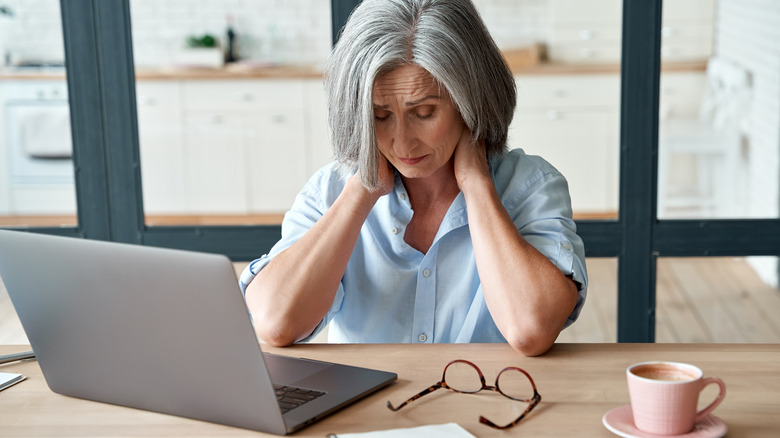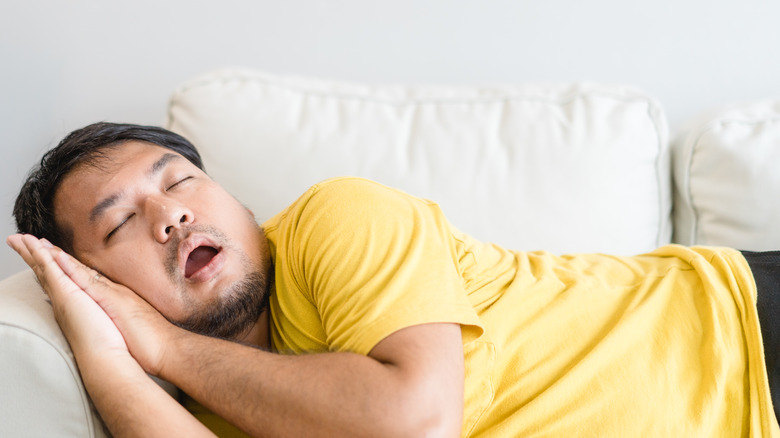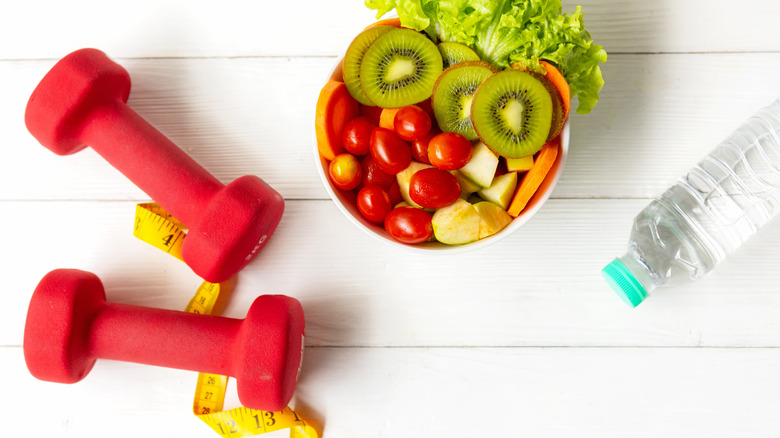Does Having High Blood Pressure Make You Tired?
High blood pressure is a condition in which the force of the blood pumped throughout your arteries is too strong. This can lead to other complications (via Mayo Clinic).
High blood pressure or hypertension is a common condition measured using a standard blood pressure reading based on two numbers, the systolic and diastolic pressures (via Mayo Clinic). Systolic pressure is the top number in the reading and represents the pressure in the arteries as the heart beats. The bottom number or diastolic pressure is the pressure in the arteries between heartbeats. A healthy reading is below 120 over 80 mm Hg. Anything above these numbers is considered elevated or high, notes the American Heart Association (AHA).
When you have high blood pressure, symptoms like trouble breathing or headaches can occur, notes Mayo Clinic. More often, there may be no noticeable symptoms at all. This situation is dangerous as high blood pressure still damages the body without apparent symptoms. This is why screenings are so important.
Fortunately, some strategies and treatments can reduce blood pressure and, therefore, mostly alleviate any of these possible symptoms. One of the symptoms of high blood pressure and its treatment that may go unrecognized is fatigue.
Ways high blood pressure leads to fatigue
Increased blood pressure requires more intense heart pumping and often indicates narrow arteries, making it strenuous for the heart to pump blood through the body. Per The Healthy, this extra resistance and effort can lead to heart failure, which occurs when blood doesn't pump properly and fluid accumulates where it shouldn't. A primary symptom of heart failure is fatigue as the heart and body struggle with improper blood circulation (via Mayo Clinic). Other conditions caused by hypertension, such as kidney failure and peripheral arterial disease, can also cause fatigue.
The Healthy adds that one of the potential causes of high blood pressure, sleep apnea, causes disturbances in sleep. Sleep apnea is a disorder that causes pauses in breathing as the body tries to sleep. These pauses cause reductions in oxygen levels that can trigger the body to awake, abruptly interrupting sleep and suddenly raising blood pressure. This process can occur hundreds of times a night, leading to a lack of quality sleep and, in turn, fatigue (per Cleveland Clinic).
While medication can be a powerful tool in lowering blood pressure, it is not free from side effects. In an interview with The Healthy, Dr. Guy L. Mintz, director of cardiovascular health & lipidology at Northwell Health's Sandra Atlas Bass Heart Hospital, noted that certain blood pressure medications such as beta-blockers and calcium channel blockers can cause fatigue. High blood pressure is also linked to stress, obesity, and lack of physical activity, all of which are associated with fatigue.
Managing fatigue
Discussing high blood pressure and feelings of fatigue with your doctor is essential, as fatigue may be a symptom of certain health conditions, warns Healthline. It is also never a bad idea to make some healthy lifestyle changes to try to lower blood pressure and reduce fatigue.
Improving sleep quality may help to alleviate sleep apnea and high blood pressure. Set a schedule that you regularly follow so your body gets accustomed to sleeping and waking at the same time daily. It is recommended for adults to strive for an 8-hour sleep window for adequate rest. Make sure your bed is comfortable and your room is a dark, cool, quiet, and relaxing environment to improve the chances of fulfilling sleep (per Mayo Clinic).
It is crucial to maintain a healthy weight with adequate exercise and proper dietary choices. Consuming healthy foods and engaging in regular exercise can lower blood pressure. Keeping weight within a healthy range can also reduce the strain that excess body mass can have on the heart (via AHA).
Healthline also suggests managing stress and quitting smoking. Engaging in these healthy practices while adhering to your doctor's prescribed treatments can do wonders for preventing feelings of fatigue caused by high blood pressure.
The AHA suggests keeping a journal of your blood pressure measurements so that you and your doctor can determine whether you are managing your blood pressure effectively. You can easily monitor your blood pressure by purchasing a blood pressure cuff.



